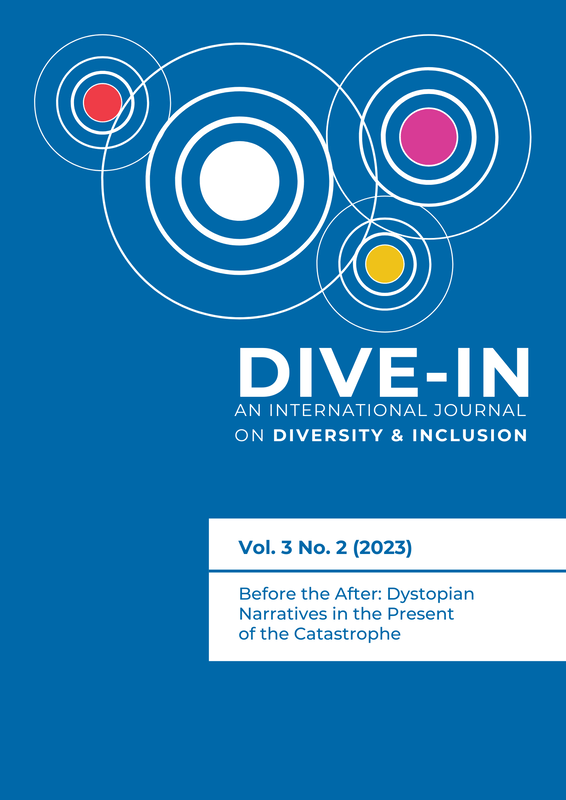The (Dystopian) Promise of Happiness: Hope, Happiness and Optimism in Contemporary Feminist Dystopias
DOI:
https://doi.org/10.6092/issn.2785-3233/19144Parole chiave:
feminist theory, utopian studies, Sara Ahmed, Lauren Berlant, Sarah Rose EtterAbstract
This article explores how recent utopian studies have conceptualized hope as a shapeless “horizon” characterized by its collective, positive and revolutionary core, and compares it to recent discussions on hope in the fields of feminist theory and affect studies that problematize affirmative conceptualizations of hope, happiness and optimism in calling for a more complex vision on the topic. Such reflections will be applied to the increasingly realistic contemporary feminist dystopias of recent years, which demonstrate a decisive change concerning where and how dystopian worlds are set and represented. Finally, an analysis of the novel The Book of X (2019) by Sarah Rose Etter, with its stunning lack of any utopian horizon traditionally intended, will try to break open Baccolini and Moylan’s definition of “critical dystopia”, detaching the presence of a critical angle from the presence of a properly intended utopian opening.
Riferimenti bibliografici
Ahmed, Sara. 2010. The promise of happiness. Durham, NC: Duke University Press.
Baccolini, Raffaella. 2000. “Gender and Genre in the Feminist Critical Dystopias of Katharine Burdekin, Margaret Atwood, and Octavia Butler.” In Marleen S. Barr (ed.), Future Females, The Next Generation. New Voices and Velocities in Feminist Science Fiction Criticism, 13–34. Lanham, MD: Rowman and Littlefield.
Baccolini, Raffaella, & Tom Moylan (eds.). 2003. Dark horizons: Science fiction and the dystopian imagination. London and New York: Routledge.
Berlant, Lauren. 2002. “Two girls, fat and thin.” In Robyn Warhol & Diane Prince Herndl (eds.), Feminisms Redux: An Anthology of Literary Theory and Criticism, 244–273. New Brunswick, NJ: Rutgers University Press.
Berlant, Lauren. 2011. Cruel optimism. Durham, NC: Duke University Press.
Berlant, Lauren. 2012. Desire/Love. New York: Punctum Books.
Cavalcanti, Ildney. 2022. “Critical dystopia.” In Peter Marks, Jennifer A. Wagner-Lawlor, Fátima Vieira (eds.), The Palgrave Handbook of Utopian and Dystopian Literatures, 65–75. Cham: Palgrave Macmillan.
Clough, Patricia T. 2008. “The Affective Turn: Political Economy, Biomedia and Bodies.” Theory, Culture & Society 25(1), 1–22.
Coleman, Rebecca, & Debra Ferreday. 2010. “Introduction: Hope and Feminist Theory.” Journal for Cultural Research 14(4), 313–321.
Dillon, Sarah. 2020. “Who Rules the World? Reimagining the Contemporary Feminist Dystopia.” In Jennifer Cooke (ed.), The New Feminist Literary Studies, 169–181. Cambridge and New York: Cambridge University Press.
Edelman, Lee. 2004. No future: Queer theory and the death drive. Durham, NC: Duke University Press.
Etter, Sarah Rose. 2019. The Book of X. Columbus, OH: Two Dollar Radio.
Jameson, Fredric. 2005. Archaeologies of the future: The desire called utopia and other science fictions. London and New York: Verso.
Levitas, Ruth. 1990. “Educated hope: Ernst Bloch on abstract and concrete utopia.” Utopian Studies 1(2), 13–26.
Levitas, Ruth. 2013. Utopia as method: The imaginary reconstitution of society. Basingstoke and New York: Palgrave Macmillan.
McRobbie, Angela. 2004. “Post‐feminism and popular culture.” Feminist Media Studies 4(3), 255–264.
McRobbie, Angela. 2008. The Aftermath of Feminism: Gender, Culture and Social Change. London: Sage.
Moylan, Tom. 2000. Scraps of the Untainted Sky: Science Fiction, Utopia, Dystopia. Boulder, CO: Westview Press.
Moylan, Tom. 2021. Becoming Utopian: The Culture and Politics of Radical Transformation. London and New York: Bloomsbury Academic.
Muñoz, José Esteban. 2009. Cruising Utopia: The Then and There of Queer Futurity. New York and London: New York University Press.
Ostalska, Katarzyna, & Tomasz Fisiak. 2021. The Postworld In-Between Utopia and Dystopia: Intersectional, Feminist, and Non-Binary Approaches in 21st-Century Speculative Literature and Culture. London and New York: Routledge.
Tower Sargent, Lyman. 1994. “The Three Faces of Utopianism Revisited.” Utopian Studies 5(1), 1–37.
Webb, Darren. 2007. “Modes of hoping.” History of the Human Sciences 20(3), 65–83.
Zournazi, Mary. 2002. Hope: New Philosophies for Change. London: Routledge.
Downloads
Pubblicato
Come citare
Fascicolo
Sezione
Licenza
Copyright (c) 2023 Marta Olivi

Questo lavoro è fornito con la licenza Creative Commons Attribuzione 4.0 Internazionale.





